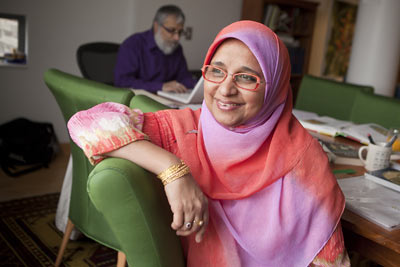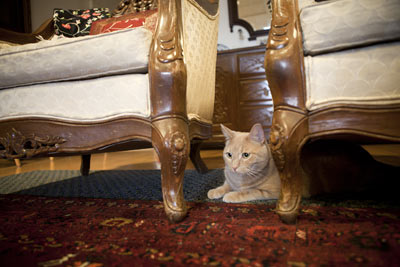Parvine Toorawa reflects on tradition and change
By Nancy Doolittle

Parvine Toorawa grew up in Mauritius, a small island in the southwest Indian Ocean. She worked in her father's corner hardware store from 9 to 5 every day for 10 years, until she left the island at age 29. Over the past two decades, she has lived in 11 cities in five countries, changing homes 12 times in her first eight years of marriage to Shawkat M. Toorawa, associate professor of Arabic literature in the Department of Near Eastern Studies.
She now provides a "home away from home" to students on North Campus through her cooking classes, dinners and other gatherings in the faculty family residence she shares with her husband, her daughters Maryam and Asiya, and the family cat, Cotomili.
"I think of myself as not very different from the person my mother raised," she said to an audience of more than 100 at the Soup and Hope talk Feb. 2 in Sage Chapel. She reflected on the juxtaposition of tradition and change in her life and on the ways her travels have changed her even as she has tried to hold on to her traditional social and religious values: "There is something cosmopolitan about me now. I am more a citizen of the world than a citizen of one place."

The things that haven't changed, which she hopes to pass on to her daughters include: observing a Muslim diet, trying to pray regularly and on time, and dressing in a modest Muslim way.
But there are ways in which she diverges from her childhood traditions: She enjoys Christmas carols and Broadway songs; she prefers to try unfamiliar local foods when she travels; and she likes nice things but does not really seek wealth to bequeath to her children.
Their new cat, Cotomili, reminds Toorawa of the values she inherited.
"My mother adored cats," Toorawa said. "She cared for every stray that wandered into our yard because, she said, they are innocent. ... She taught me that true value is not measured in dollars and cents, but in love and compassion."
Sometimes, in thinking of her own small crafts business, Toorawa becomes discouraged by its slow start. But, she said, while the natural instinct is to make money and hold on to it, save it, and invest it, "it is important for me to remember to overcome that instinct with another one, namely to give."
In Muslim belief, Toorawa said, if you give, especially to the poor, to guests, to orphans and others, God gives back to you many times over, and "giving away doesn't in any way diminish what you have."
So, she concluded, "I try to be grateful for what I have. To be grateful for what I can give away. To be grateful that I have changed. Grateful especially for my family. And grateful to count so many of you among my friends."
Media Contact
Get Cornell news delivered right to your inbox.
Subscribe